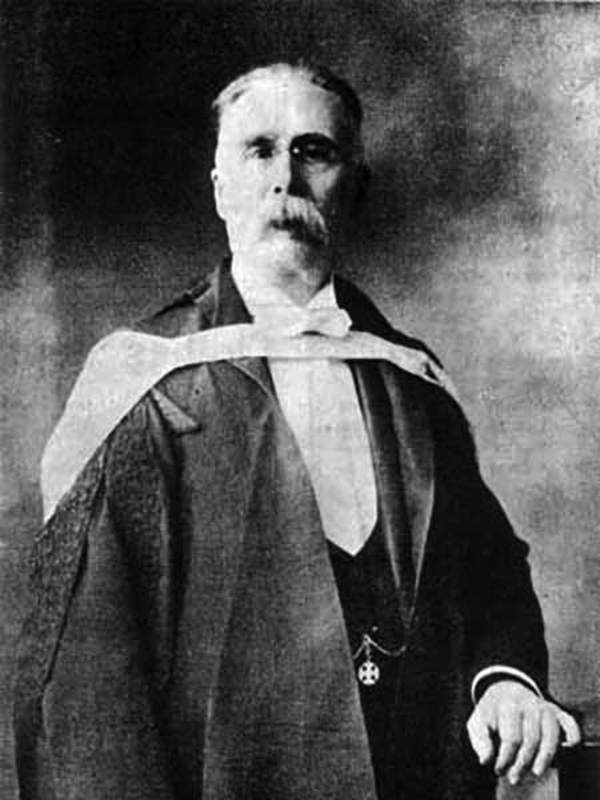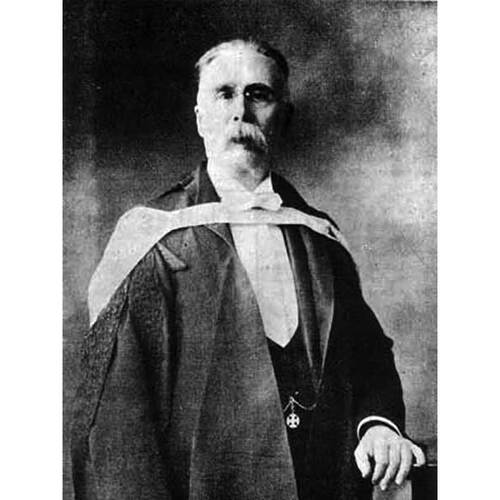
Source: Link
HORNER, RALPH JOSEPH, conductor, composer, music teacher, and journalist; b. 28 April 1848 in Newport, Monmouthshire, Wales, son of James Horner and Sarah —; m. there first 1869 Marianne Amelia Rowse (d. 1915), and they had three sons and a daughter; m. secondly 3 June 1920 Mrs Sarah Aily Carter in Winnipeg; d. 7 April 1926 in Winnipeg.
Although Ralph Horner’s earliest proclivities were musical, he was apparently destined for a business career. Yet “the natural bent of his mind was so clearly manifested,” a later biographical account states, “and his progress so rapid that at the age of eleven he officiated as pianist to the Newport Choral Society notwithstanding parental opposition.”
From 1864 to 1867 Horner studied at the Leipzig Conservatory. After returning to London in 1868 he conducted choirs and operatic productions for the Peckham Choral Society and was choirmaster at St Mary’s Church, Peckham. For seven years he directed the English Opera Company and also operas at Alexandra Palace, London. He taught piano, singing, and harmony at Camberwell (London) during 1869. From 1878 to 1888 he conducted operas composed by Gilbert and Sullivan throughout the British provinces. Following these successful tours he settled in Nottingham, where he led the Nottingham Amateur Orchestral Society, the Nottingham Operatic Society, and the Nottingham Philharmonic Choir. He lectured in music at University College in Nottingham for ten years. In 1893 he took a bm and in 1898 a dm, both at the University of Durham.
In 1906 Horner landed in North America and for a brief period he lived in New York City. In 1909 he arrived in Winnipeg. He was immediately named director of the Imperial Academy of Music and Arts, a position he held until 1911. As music editor from 1909 to 1914 of Winnipeg Town Topics, high society’s weekly journal of cultural, musical, and artistic matters, he helped establish standards of taste for many Winnipeggers. From 1909 to 1912 he conducted the Winnipeg Oratorio Society. He also directed an opera troupe, which in 1911 presented his comic opera The belles of Barcelona. A charter member of the Men’s Musical Club of Manitoba, he served as vice-president during its inaugural year, 1915–16. The club’s mandate was the promotion, elevation, and extension of the “art of music.” Members also discouraged and condemned any measures which would debase the standard of music in Manitoba. This objective befitted Horner’s principles and status as well as the genteel aspirations of the amateur and professional artistic community carving a niche for itself within the rapidly growing metropolis of Winnipeg. The club would continue to perform Horner’s work after he left it to serve as bandmaster in the 190th and 250th Infantry battalions during 1916–17. Following World War I he resumed teaching music in Winnipeg and he served as choirmaster of St Matthew’s Church from 1921 to 1925. From about 1917 until his death he directed the Ralph Horner Opera Company in Winnipeg.
Horner’s musical compositions were many and varied. They included operas (Amy Robsart, The belles of Barcelona, and A fairy overture), the Intermezzo for orchestra in B major, six operettas, two oratorios (St. Peter’s and David’s first victory), cantatas (including the dramatic cantata Confucius), many piano pieces, several anthems, and part-songs. Some of his approximately 100 songs were published by the firm Reeder, Weekes, and Ashdown.
A prominent member of social and musical circles for many years, Ralph Horner was described as “Winnipeg’s grand old man of music, and one of her best known citizens,” a reputation he well deserved.
Man., Dept. of Finance, Consumer and Corporate Affairs, Vital statistics (Winnipeg), no.1920-03126. Manitoba Free Press, 24 Sept. 1909, 8–9 April 1926. Encyclopedia of music in Canada (Kallmann et al.). G Sharp Major [G. S. Mathieson], Crescendo; a business man’s romance in music (Winnipeg, [1935?]). Pioneers and prominent people of Manitoba, ed. Walter McRaye (Winnipeg, 1925). Who’s who and why, 1921.
Cite This Article
David Larsen, “HORNER, RALPH JOSEPH,” in Dictionary of Canadian Biography, vol. 15, University of Toronto/Université Laval, 2003–, accessed February 21, 2026, https://www.biographi.ca/en/bio/horner_ralph_joseph_15E.html.
The citation above shows the format for footnotes and endnotes according to the Chicago manual of style (16th edition). Information to be used in other citation formats:
| Permalink: | https://www.biographi.ca/en/bio/horner_ralph_joseph_15E.html |
| Author of Article: | David Larsen |
| Title of Article: | HORNER, RALPH JOSEPH |
| Publication Name: | Dictionary of Canadian Biography, vol. 15 |
| Publisher: | University of Toronto/Université Laval |
| Year of publication: | 2005 |
| Year of revision: | 2005 |
| Access Date: | February 21, 2026 |



